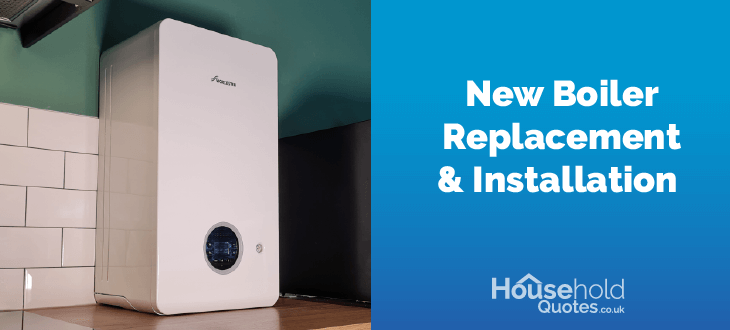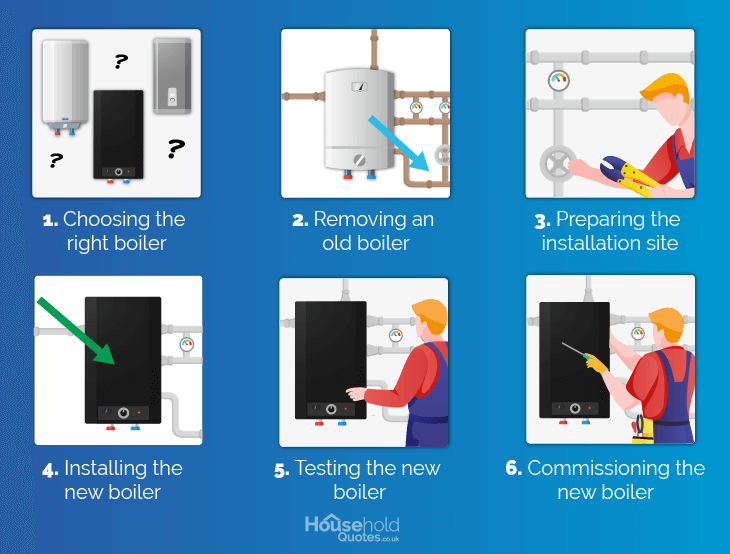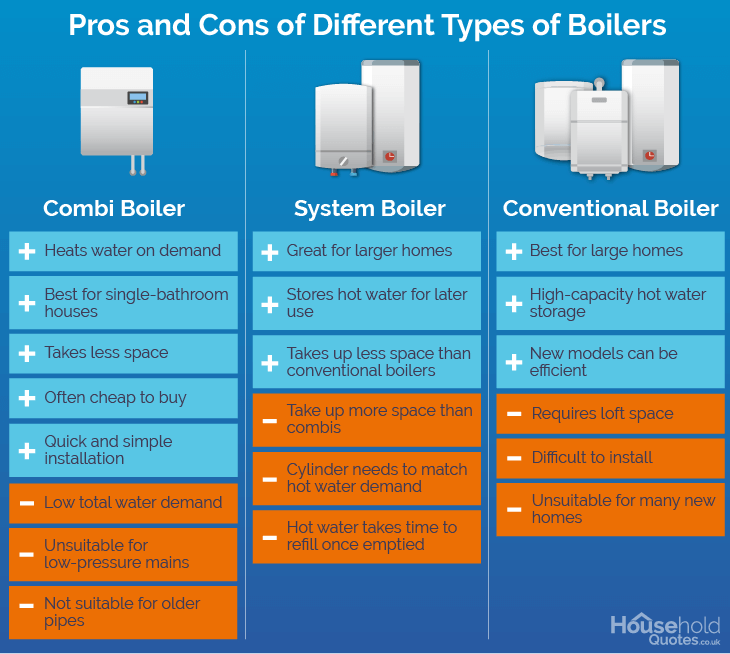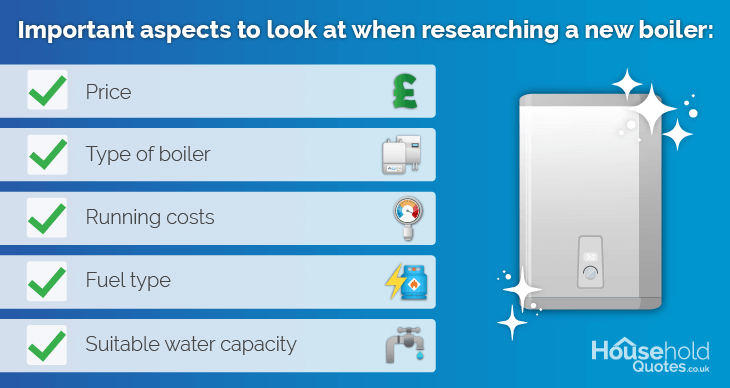Answer these simple questions and we will find you the BEST prices
Which type of solar quotes do you need?
It only takes 30 seconds
100% free with no obligation

Get up to 3 quotes by filling in only 1 quick form

Compare quotes and find yourself the best deal

Increase the value of your home by installing a new boiler
- Householdquotes.co.uk
- Boilers
- Boiler Replacement
New Boiler Replacement & Installation in 2025


Boiler replacement and installation can be a confusing process if you don’t have prior knowledge. As an expensive undertaking, replacing your boiler requires understanding the differences between types and fuels, along with whether they will suit your home’s water and energy needs. But don’t worry because we’ll walk you through different types of boilers, their pros and cons, their costs, and when it’s best to change your boiler for another.
However, if you’re already in the market for a new boiler and need some assistance, it’s best to contact a professional installer. Finding one you can trust can take days of laborious research into companies and their prices. Luckily, we offer a better way that can save you money, time, and effort on a new boiler in the UK.
Our service can quickly and easily provide you with 3 free, non-binding quotes from installers in your area. Every installer in our network has been thoroughly vetted so you can be sure you’ll find a reliable professional for your needs. All you have to do is click the button below and fill out a simple 30-second form to get started.
- Quotes from local installers
- Payment by finance available
- Save up to £975
It only takes 30 seconds

- Why get a new boiler?
- How does a new boiler replacement & installation work?
- Which boilers can you choose from with a new boiler replacement?
- What is the cost of a new boiler replacement & installation?
- When should I replace my boiler?
- What to look for in a new boiler
- Get free quotes for a new installation
- FAQ
Why get a new boiler?
There are many reasons to opt for a new boiler installation:
How does a new boiler replacement & installation work?

The boiler installation process involves:
Which boilers can you choose from with a new boiler replacement?
Boilers can be divided using 2 different criteria: Boiler type and fuel type. The boiler type decides how the boiler functions and the fuel type determines what it runs on. Both of these can determine the running costs of the new boiler and installation plus purchase costs.
Different boiler types

Combi boilers are great for more compact homes, usually ones with a single bathroom. They heat water on demand, providing it without a tank or cistern. Combi boiler prices tend to be lower than system and conventional models along with having a higher efficiency, they can waste more electricity due to on-demand heating if you consume a lot of water.
Still, they are cheap to buy, can be great for saving when your total water consumption is fairly low, and are very easy to install. On the other hand, they are not ideal as a replacement central heating boiler for older homes or large homes, and sport lower pressure overall.
System boilers can take up more space than combis but they are ideal for larger homes. These boilers store hot water in a tank for later use so they can keep a higher capacity. However, when the tank runs out, it can take a while to put out more hot water.
Still, they provide for homes with high demand and still take up less space than conventional boilers, making them a popular choice. System boiler prices can range from £1,100 to £3,200.
Conventional boilers are usually found in large, older homes and are very powerful. The downside is that they take up a lot of space, often needing an entire loft just to operate. They store up even more hot water than a system boiler. While older boilers tend to be inefficient, there are more recent conventional boilers that can get up to 97% efficiency.
Conventional boilers can cost a lot to install since they are quite massive and swapping them for other systems can also be expensive. This makes them unsuitable for many smaller, newer homes where you need to fit a new boiler that may take more room or need extensive pipework.
Different boiler fuels
| Average price of electricity & gas per Region (pence/kWh) | ||
|---|---|---|
| England, Scotland and Wales | Northern Ireland | |
| Off-peak Economy 7 | 16.35 | 11.9 |
| On-peak Economy 7 | 33.4 | 21.1 |
| Standard rate | 28.3 | 22.6 |
| Gas | 7.4 (+ £99.35/year standing charge) |
7.2 |
| LPG | 15.5 (+ £62.84/year standing charge) |
17.3 (+ £63.01/year standing charge) |
| Oil | 11.66 | 16.83 |
While gas is the cheapest and most common type of boiler fuel, some homes may not have a gas main. Alternatives like oil or LPG (liquefied petroleum gas) are often used instead, but oil boiler prices can be fairly high, starting at £1,000 (excluding installation). Electric boilers can be costly in terms of energy source but they often have 99% to 100% efficiency.
If you want to find the best central heating prices to match your home, you will need to consult a professional installer. The problem is that finding a reliable one within your area can be a difficult task, often requiring days of difficult research and seeking out companies to compare their prices. If all of that sounds like a chore, we can provide a better way to find the help you need.
Our service is a quick and easy way to find the best prices in your area. Every installer in our network is thoroughly vetted so you can be sure you’ll get a professional service. Moreover, we provide you with 3 free, non-binding quotes so you can make the best choice. All you have to do is fill out a 30-second form and we’ll do the rest. Click the button below to get started.
- Quotes from local installers
- Payment by finance available
- Save up to £975
It only takes 30 seconds

What is the cost of a new boiler replacement & installation?
Before you replace a boiler, here are the costs you should consider.
| Boiler type price comparison | |||
|---|---|---|---|
| Type of boiler | Average power supply (kW) | Estimated supply cost | Total estimated cost (incl. installation) |
| Combi boiler | 18 to 35kW | £500 to £3,000 | £1,000 to £3,500 |
| System boiler | 15 to 65kW | £5,80 to £3,500 | £1,000 to £4,000 |
| Conventional/regular boiler | 12 to 30kW | £600 to £3,500 | £1,100 to £4,000 |
Combis can be the cheapest heating system but they tend to use up a lot more energy since they perform a dual function. It’s important to take power output into account.
On average, more complex installations will err towards higher installation costs. Thus, gas boiler replacement can get more expensive since it requires the removal of a gas line and associated components requiring more time and labour. Similarly, adding a replacement gas boiler requires adding a connection to the gas main, which can drive up the price.
For more exact product prices, you can check out a selection of our boiler manufacturers pages:
When should I replace my boiler?
Boilers tend to last 10 to 15 years but you can exceed this and add 5 or more years by regularly maintaining them. Boilers can be an expensive undertaking so we highly recommend getting them checked, especially gas boilers which can leak hazardous fumes.
There are many signs that your boiler is circling the drain. A central heating boiler replacement may be necessary if you are seeing your heating bills go up. A tune-up may fix this but if it occurs continuously, you could replace the boiler. Most boiler warranties are 5 to 10 years so be sure to check with your installer or manufacturer if your warranty still applies.
Other signs include leaking, noisy operation, frequent errors, and low pressure. Be sure to keep an eye out for these, though they may not necessarily mean something as critical as full boiler replacements.
What to look for in a new boiler

When looking for a new boiler you should consider the following:
Get free quotes for a new installation
Getting a replacement boiler need not cost you an arm and a leg but finding the best prices requires a lot of effort. Many people research companies and their prices for days and get nowhere. This is why we offer a better way of finding the most reliable installers for your needs and keeping down those new boiler costs.
Our service can streamline your search by providing up to 3 free, non-binding quotes from reliable installers we’ve thoroughly vetted for you. You can easily obtain the best prices for a new boiler for home heating. All you have to do is click the button below and fill out a 30-second form to get the best offers for a new replacement boiler in the UK.
- Quotes from local installers
- Payment by finance available
- Save up to £975
It only takes 30 seconds

FAQ
A Gas Safe registered plumber usually charges £500 to £1,000 for replacing a boiler. It’s best to obtain multiple quotes from reliable professionals to adequately compare prices.
Getting a new boiler fitted can take 1 to 3 days, depending on the complexity of installation. The process can get more complex based on numerous factors, which can prolong installation.
The average life of a boiler is 10 to 15 years but it can be more if it is maintained and serviced regularly. Even so, there are many reasons to get a new boiler in terms of cost-cutting and safety.
Yes. It is likely that over two decades, the boiler loses efficiency, costs you more in electricity, or (for gas boilers) starts leaking hazardous fumes. It’s best to contact a professional to assess your options.

Rawal is an ex-tech journalist with a passion for sustainable innovations, green policies, and their adoption. With a straightforward writing style meant to be easily digested but full of handy tips, they are geared towards readers of all levels of familiarity with the technologies and home appliances covered.
- Why get a new boiler?
- How does a new boiler replacement & installation work?
- Which boilers can you choose from with a new boiler replacement?
- What is the cost of a new boiler replacement & installation?
- When should I replace my boiler?
- What to look for in a new boiler
- Get free quotes for a new installation
- FAQ
